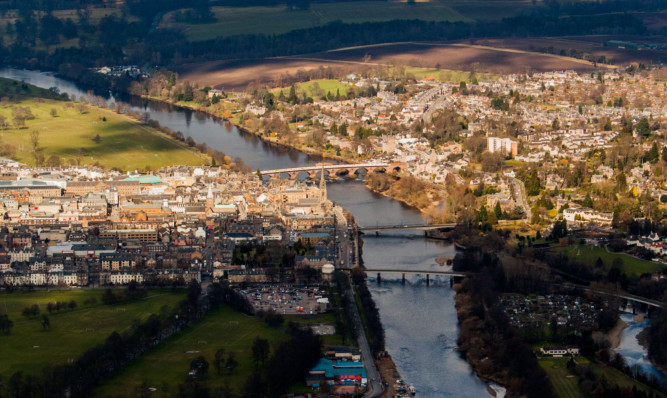The River Tay could be harnessed to heat homes, businesses and schools across Perth as part of a radical new drive to fight pollution and cut household bills.
Perth and Kinross Council is considering revolutionary new carbon-free technology which would draw power from the Tay to generate thermal energy.
The “game changing” heat pump system, understood to be the first of its kind in Scotland, will heat up cold river water and be used to service the city’s new food and drink park, as well as nearby schools, homes and businesses.
It is understood the scheme could reduce energy costs by 20%. The council has already secured £50,000 of Scottish Government funding to develop the scheme, as well as another renewables development.
A £20,000 feasibility study has been launched into separate proposals for a sustainable travel hub in Perth, which aims to dramatically reduce the amount of vehicles coming into the city.
It would go some way to addressing long-standing congestion and air quality issues.
Both projects are part of the much-heralded Tay Eco-Valley initiative, which aims to use innovative eco projects as a driver for sustainable growth.
Anti-windfarm campaigners questioned the proposed heat pump plan’s effectiveness and warned it was unlikely to be a workable alternative to turbines.
Graham Lang, who chairs Scotland Against Spin, said: “To date, air-sourced and ground-sourced heat pumps have been the most common way of producing renewable heat, using latent energy.
“Water-source heat pumps to provide low-cost sustainable heat sounds a great idea but it is more limited in its application.
“Like all wind or tidal and other renewables it has to be subsidised to encourage uptake and while those who can deploy it receive a financial reward, those that cannot foot the bill.”
Heat pump technology was described by energy secretary Ed Davey as “game changing” when the UK’s first system was installed in the River Thames last year.
Perth and Kinross Council enterprise and infrastructure committee convener John Kellas said both schemes could have major benefits for the city and surrounding area.
“Its early days, but it will be very interesting to see how these schemes develop,” he said.
“Perth has its problems with air quality and congestion, like many other places of similar scale and size, and it is important that steps are taken to address these issues.”
Consultants have been tasked with collating and analysing technical data before presenting business cases to council leaders in the coming weeks.
Mr Kellas said the potential to create renewable energy from the Tay should be fully investigated.
He added: “The sustainable hub could also make a big difference to Perth and could see less traffic, or larger vehicles, coming into the city, which would help tremendously.”
Mr Kellas said the hub would have power points to encourage hydrogen, biofuel and electric powered vehicles.
The council is also working on a separate freight consolidation hub.
